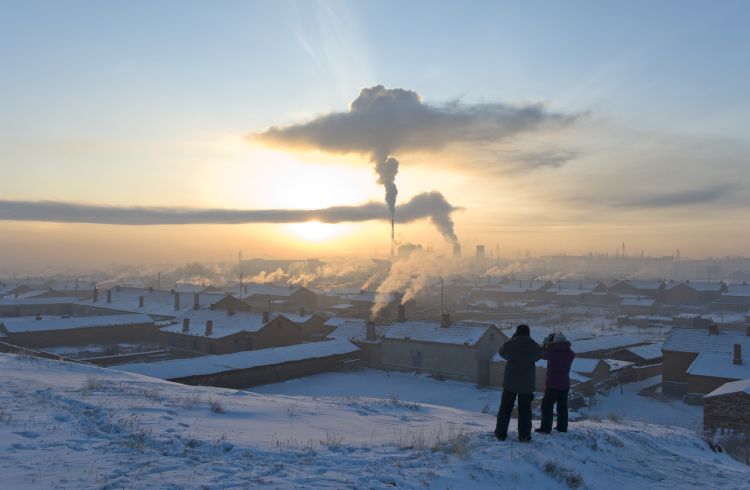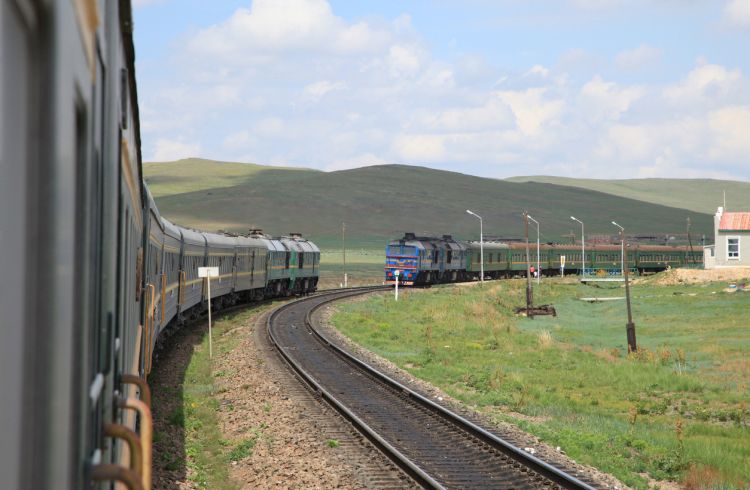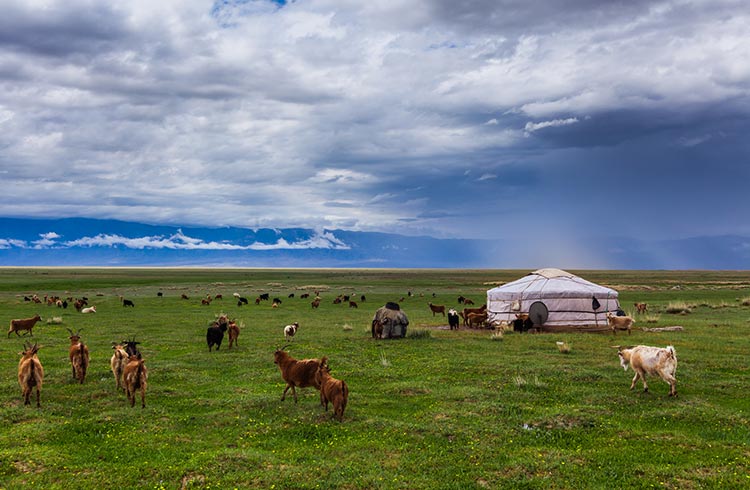Staying Healthy & Safe in Mongolia - Travel Tips
Mongolia is still a developing country, and the standard of healthcare facilities varies. Here's how you can avoid some of the common health hazards while traveling.
 Photo © iStock.com/Tarzan9280
Photo © iStock.com/Tarzan9280
- Medical Treatment in Mongolia
- Vaccinations for Mongolia
- Disease Risks in Mongolia
- Water Sanitation in Mongolia
- Air Pollution in Mongolia
- Weather in Mongolia
Medical Treatment in Mongolia
The standard of medical care can vary across Mongolia especially in more rural locations. Medical treatment in Ulaanbaatar is basic, so if you need to see a doctor, even for something minor, ask your tour guide or contact your embassy for a recommendation. Private hospitals and clinics operate in the capital, but it's likely you will need to pay upfront for attending. And as always, make sure you have adequate travel insurance which covers medical expenses including emergency evacuation.
Bring the medications you may need from home and a doctor's letter explaining their use, as supplies locally can be low or of poor quality. It's also a good idea to pack a travel medical kit especially if you plan to head out of Ulaanbaatar. Ladies, bring your own sanitary products with you if heading into rural areas as they are non-existent outside of the major cities.
Vaccinations for Mongolia
Recommended vaccinations for Mongolia are:
- Routine vaccinations such as MMR, polio, tetanus, diphtheria
- Hepatitis A
- Hepatitis B (Important as standards of hygiene can vary in Mongolian health facilities)
- Typhoid
- Rabies
Disease Risks in Mongolia
Hepatitis A
Contracted via contaminated food and water, Hepatitis A can be avoided with good personal hygiene, avoiding unpasteurized dairy and drinks with ice, plus eat fruit and vegetables you can peel or wash only with treated water. Vaccination is available and strongly recommended.
Hepatitis B
Hepatitis B is endemic in the country and mostly passed via contaminated blood e.g blood transfusions, poor hygiene practices, and medical treatment. Symptoms include jaundice, abdominal pain, nausea, vomiting, dark colored urine and muscle ache. Vaccination is available and strongly recommended.
Bubonic Plague
Breakouts of bubonic plague have been reported in rural areas of Mongolia in the late summer months of August and September. Marmots (large squirrels) may carry fleas infected with bubonic plague, so if you plan on having a marmot barbecue (quite common in Mongolia), you should be sure that you trust whoever is preparing the meat. Cases are usually isolated and are very rare, mostly confined to hunters who skin the marmots.
The cooking process usually kills any bugs unlucky enough not to have escaped with the skin. Do not to approach any living (or dead marmots before they've been prepared for cooking), especially in the summer months.
Symptoms include fever, swollen lymph glands, muscle aches and headache.
Should you contract bubonic plague, you'll need strong antibiotics so don't hesitate to get to a hospital. If left untreated, it can be fatal.
Rabies
Stray dogs roam the side streets of major cities but as cute as they may seem, don't approach these dogs. Rabies is endemic in Mongolia and other wild animals can also carry the disease.
It is recommended that you get a rabies vaccination if you are planning outdoor activities (such as camping, hiking, biking, adventure travel, and caving) that put you at risk for animal bites. Vaccination gives you more time to reach medical help, and to start the course of injections needed to treat rabies; with slow transport and long distances to travel in Mongolia, this could be a life-saver.
Rabies can be transmitted from the saliva of a rabid animal to humans via biting, scratching or even licking an open wound.
If you are bitten by a rabid dog or animal, clean the wound thoroughly with soap and water for at least 15 minutes, then apply an alcohol solution followed by an iodine-based solution (Betadine).
Seek medical treatment immediately. If left untreated, rabies is 100% fatal. Call your travel insurance provider's emergency assistance number immediately, and they will arrange care in the fastest possible time and medical evacuation if required.
Tick-Borne Encephalitis
Tick-Borne Encephalitis is found in Mongolia in areas lower than 2,460ft (750m). As no vaccine is available, it's advised to take all necessary precautions to avoid being bitten, especially if you're planning to participate in outdoor activities such as hiking, camping etc. Tick-Borne Encephalitis is spread through tick bites and occasionally from unpasteurized dairy products.
Water Sanitation in Mongolia
While most restaurants in Ulaanbaatar use modern sanitation practices to ensure that any harmful organisms in the water are killed, you may not be so lucky eating in establishments outside the capital.
Locals have developed tolerances to local water bugs and illnesses, but you're unlikely to be so lucky. In addition, the Mongolian diet is typically hard on the stomach and it's likely at some point you may contract a stomach bug if you drink the water directly from a well or tap.
If you are visiting somebody's home, ask for tea instead of water, even if you don't like tea. The boiled water is more likely to neutralize any harmful elements in the water and this way you don't have to be rude to your hosts.
Be sure to carry water purification tablets or a water filter if you plan on going on an extensive backpacking or hiking tour through the Mongolian desert or other wilderness areas. It's ok to drink from natural streams as long as there isn't any livestock around however it's probably best to sterilize the water just to be safe.
Even in a town or city, you might not be able to safely drink the water. Carry a portable hiking stove, or if you are staying at a hotel or home with electricity, and boil any water before drinking it or filling your water bottles.
Check out this article for more handy tips on water sanitation.
Air Pollution in Mongolia
As a developing nation, Mongolia is currently experiencing rapid industrialization.
With all of the excitement and none of the regulations that come with creating a clean urban environment, air pollution is a huge problem in and around the capital city of Ulaanbaatar. Fires lit for warmth in urban homes produce smoke, locals use anything as fuel to burn and there are poor ash disposal methods. Mongolia's air pollution is five times that of Beijing, China, and is placing the country at risk of a health crisis.
The World Health Organization has reported around 4,000 people die each year from health conditions including lung cancer caused by air pollution in Mongolia, and thousands more suffer from complications of exposure including respiratory conditions, pregnancy issues and poor development in babies and children.
If you suffer from lung or heart problems, avoid traveling to Mongolia in the winter months. Winter is when the air is most polluted due to locals lighting fires to keep warm against the harsh temperatures, but it's a problem year-round.
Carry oxygen masks, re-breathers or other apparatus used to assist in breathing, especially if you are concerned about your lungs or heart. Symptoms may include shortness of breath, coughing, dizziness, and fatigue. If the polluted air becomes too much for you, consider a trip out of the cities to the countryside for fresh air.
Weather in Mongolia
Mongolian weather can be unpredictable at best, with radical changes between daytime and nighttime temperatures. The altitude of the country, plus its location in the middle of the desert steppes of East Asia, results in extremes in weather which can vary from 95°F (35°C) in summer to -40°F/C in winter. Hypothermia is a real risk in Mongolia, and it's a must for every traveler to dress in layers to keep warm as temperatures can drop to sub-zero overnight.
Even in summer, temperatures can be cold, so rug up in plenty of layers and check the forecasts before you go. Summer also brings rain, so pack a waterproof jacket or raincoat, plus a scarf can be handy, as gusts of wind may make it difficult to traverse the beautiful bluffs, steppes,
However, with the right preparation, these extremes won't kill you. Sunburn, heatstroke, and heat exhaustion are risks, as many parts of Mongolia don't have shaded areas including forests or even a few trees. Wear long-sleeved clothing, hydrate yourself frequently and use a broad spectrum sunscreen to protect yourself from the sun.
It's a good idea to carry a satellite phone and/or GPS if you plan on traveling beyond Ulaanbaatar, in case of a weather-related emergency. You can also pick up a SIM card for your cell phone at the State Department Store - Mobicom and Unitel are good choices - but you will only get reception (including 3G) when you are passing through one of the small towns or in Ulaanbaatar.
Related articles
Simple and flexible travel insurance
You can buy at home or while traveling, and claim online from anywhere in the world. With 150+ adventure activities covered and 24/7 emergency assistance.
Get a quote

No Comments